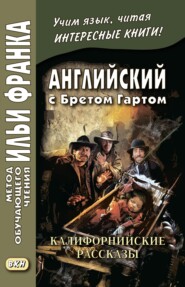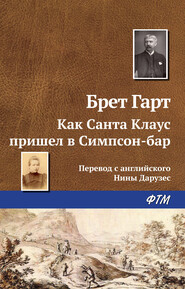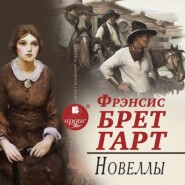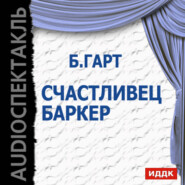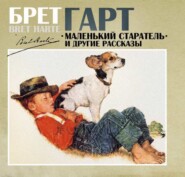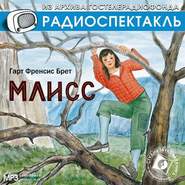По всем вопросам обращайтесь на: info@litportal.ru
(©) 2003-2024.
✖
Gabriel Conroy
Автор
Год написания книги
2017
Настройки чтения
Размер шрифта
Высота строк
Поля
For the rest of Colonel Starbottle's life he never ceased to deplore this last act of caution, and regret that he had not put the cheque in his pocket. For as he walked to the window the floor suddenly appeared to rise beneath his feet and as suddenly sank again, and he was thrown violently against the mantelpiece. He felt sick and giddy. With a terrible apprehension of apoplexy in his whirling brain, he turned toward his companion, who had risen from his seat and was supporting himself by his swinging desk with a panic-stricken face and a pallor equal to his own. In another moment a bookcase toppled with a crash to the floor, a loud outcry arose from the outer offices, and amidst the sounds of rushing feet, the breaking of glass, and the creaking of timber, the two men dashed with a common instinct to the door. It opened two inches and remained fixed. With the howl of a caged wild beast Dumphy threw himself against the rattling glass of the window that opened on the level of the street. In another instant Colonel Starbottle was beside him on the side-walk, and the next they were separated, unconsciously, uncaringly, as if they had been the merest strangers in contact in a crowd. The business that had brought them together, the unfinished, incomplete, absorbing interests of a moment ago were forgotten – were buried in the oblivion of another existence, which had no sympathy with this, whose only instinct was to fly – where, they knew not!
The middle of the broad street was filled with a crowd of breathless, pallid, death-stricken men who had lost all sense but the common instinct of animals. There were hysterical men, who laughed loudly without a cause, and talked incessantly of what they knew not. There were dumb, paralysed men, who stood helplessly and hopelessly beneath cornices and chimneys that toppled over and crushed them. There were automatic men, who flying, carried with them the work on which they were engaged – one whose hands were full of bills and papers, another who held his ledger under his arm. There were men who had forgotten the ordinary instincts of decency – some half-dressed. There were men who rushed from the fear of death into its presence; two were picked up, one who had jumped through a skylight, another who had blindly leaped from a fourth-story window. There were brave men who trembled like children; there was one whose life had been spent in scenes of daring and danger, who cowered paralysed in the corner of the room from which a few inches of plastering had fallen. There were hopeful men who believed that the danger was over, and having passed, would, by some mysterious law, never recur; there were others who shook their heads and said that the next shock would be fatal. There were crowds around the dust that arose from fallen chimneys and cornices, around runaway horses that had dashed as madly as their drivers against lamp-posts, around telegraph and newspaper offices eager to know the extent of the disaster. Along the remoter avenues and cross-streets dwellings were deserted, people sat upon their doorsteps or in chairs upon the sidewalks, fearful of the houses they had built with their own hands, and doubtful even of this blue arch above them that smiled so deceitfully; of those far-reaching fields beyond, which they had cut into lots and bartered and sold, and which now seemed to suddenly rise against them, or slip and wither away from their very feet. It seemed so outrageous that this dull, patient earth, whose homeliness they had adorned and improved, and which, whatever their other fortune or vicissitudes, at least had been their sure inheritance, should have become so faithless. Small wonder that the owner of a little house, which had sunk on the reclaimed water front, stooped in the speechless and solemn absurdity of his wrath to shake his clenched fist in the face of the Great Mother.
The real damage to life and property had been so slight and in such pronounced contrast to the prevailing terror, that half an hour later only a sense of the ludicrous remained with the greater masses of the people. Mr. Dumphy, like all practical, unimaginative men, was among the first to recover his presence of mind with the passing of the immediate danger. People took confidence when this great man, who had so much to lose, after sharply remanding his clerks and everybody else back to business, re-entered his office. He strode at once to his desk. But the envelope was gone! He looked hurriedly among his papers – on the floor – by the broken window – but in vain.
Mr. Dumphy instantly rang his bell. The clerk appeared.
"Was that draft paid?"
"No, sir; we were counting the money when" —
"Stop it! – return the draft to me."
The young man was confiding to his confrères his suspicions of a probable "run" on the bank as indicated by Mr. Dumphy's caution, when he was again summoned by Mr. Dumphy.
"Go to Mr. Poinsett's office and ask him to come here at once."
In a few moments the clerk returned out of breath.
"Mr. Poinsett left a quarter of an hour ago, sir, for San Antonio."
"San Antonio?"
"Yes, sir – they say there's bad news from the Mission."
CHAPTER VII.
IN WHICH BOTH JUSTICE AND THE HEAVENS FALL
The day following the discovery of the murder of Victor Ramirez was one of the intensest excitement in One Horse Gulch. It was not that killing was rare in that pastoral community – foul murder had been done there upon the bodies of various citizens of more or less respectability, and the victim in the present instance was a stranger and a man who awakened no personal sympathy; but the suspicion that swiftly and instantly attached to two such important people as Mr. and Mrs. Conroy, already objects of severe criticism, was sufficient to exalt this particular crime above all others in thrilling interest. For two days business was practically suspended.
The discovery of the murder was made by Sal, who stumbled upon the body of the unfortunate Victor early the next morning during a walk on Conroy's Hill, manifestly in search of the missing man, who had not returned to the hotel that night. A few flippant souls, misunderstanding Miss Clark's interest in the stranger, asserted that he had committed suicide to escape her attentions, but all jocular hypothesis ceased when it became known that Gabriel and his wife had fled. Then came the report that Gabriel had been seen by a passing miner early in the day "shoving" the stranger along the trail, with his hand on his collar, and exchanging severe words. Then the willing testimony of Miss Clark that she had seen Mrs. Conroy in secret converse with Victor before the murder; then the unwilling evidence of the Chinaman who had overtaken Gabriel with the letter, but who heard the sounds of quarrelling and cries for help in the bushes after his departure; but this evidence was excluded from the inquest, by virtue of the famous Californian law that a Pagan was of necessity a liar, and that truth only resided in the breast of the Christian Caucasian, and was excluded from the general public for its incompatibility with Gabriel's subsequent flight, and the fact that the Chinaman, being a fool, was probably mistaken in the hour. Then there was the testimony of the tunnel-men to Gabriel's appearance on the hill that night. There was only one important proof not submitted to the public or the authorities – Mrs. Conroy's note – picked up by Sal, handed to Mrs. Markle, and given by her to Lawyer Maxwell. The knowledge of this document was restricted to the few already known to the reader.
A dozen or more theories of the motive of the deed at different hours of the day occupied and disturbed the public mind. That Gabriel had come upon a lover of his wife in the act of eloping with her, and had slain him out of hand, was the first. That Gabriel had decoyed the man to an interview by simulating his wife's handwriting, and then worked his revenge on his body, was accepted later as showing the necessary deliberation to constitute murder. That Gabriel and his wife had conjointly taken this method to rid themselves of a former lover who threatened exposure, was a still later theory. Towards evening, when One Horse Gulch had really leisure to put its heads together, it was generally understood that Gabriel and Mrs. Conroy had put out of their way a dangerous and necessarily rightful claimant to that mine which Gabriel had pretended to discover. This opinion was for some time – say two hours – the favourite one, agreeing as it did with the popular opinion of Gabriel's inability to discover a mine himself, and was only modified by another theory that Victor was not the real claimant, but a dangerous witness that the Conroys had found it necessary to dispose of. And when, possibly from some unguarded expression of Lawyer Maxwell, it was reported that Gabriel Conroy was an impostor under an assumed name, all further speculation was deemed unnecessary. The coroner's jury brought in a verdict against "John Doe, alias Gabriel Conroy," and One Horse Gulch added this injury of false pretence to other grievances complained of. One or two cases of horse-stealing and sluice-robbing in the neighbourhood were indefinitely but strongly connected with this discovery. If I am thus particular in citing these evidences of the various gradations of belief in the guilt of the accused, it is because they were peculiar to One Horse Gulch, and of course never obtained in more civilised communities.
It is scarcely necessary to say that one person in One Horse Gulch never wavered in her opinion of Gabriel's innocence, nor that that person was Mrs. Markle. That he was the victim of a vile conspiracy – that Mrs. Conroy was the real culprit, and had diabolically contrived to fasten the guilt upon her husband, Mrs. Markle not only believed herself, but absolutely contrived to make Lawyer Maxwell and Sal believe also. More than that, it had undoubtedly great power in restraining Sal's evidence before the inquest, which that impulsive and sympathetic young woman persisted in delivering behind a black veil and in a suit of the deepest mourning that could be hastily improvised in One Horse Gulch.
"Miss Clark's evidence," said the Silveropolis Messenger, "although broken by sobs and occasional expressions of indignation against the murderer, strongly impressed the jury as the natural eloquence of one connected with the tenderest ties to the unfortunate victim. It is said that she was an old acquaintance of Ramirez, who was visiting her in the hope of inducing her to consent to a happy termination of a life-long courtship, when the dastard hand of the murderer changed the bridal wreath to the veil of mourning. From expressions that dropped from the witness's lips, although restrained by natural modesty, it would not be strange if jealousy were shown to be one of the impelling causes. It is said that previous to his marriage the alleged Gabriel Conroy was a frequent visitor at the house of Miss Clark."
I venture to quote this extract not so much for its suggestion of a still later theory in the last sentence, as for its poetical elegance, and as an offset to the ruder record of the One Horse Gulch Banner, which, I grieve to say, was as follows: —
"Sal was no slouch of a witness. Rigged out in ten yards of Briggs' best black glazed muslin, and with a lot of black mosquito netting round her head, she pranced round the stand like a skittish hearse horse in fly-time. If Sal calculates to go into mourning for every man she has to sling hash to, we'd recommend her to buy up Briggs' stock and take one of Pat Hoolan's carriages for the season. There is a strong feeling among men whose heads are level, that this Minstrel Variety Performance is a bluff of the Messenger to keep from the public the real motives of the murderer, which it is pretty generally believed concerns some folks a little higher-toned than Sal. We mention no names but we would like to know what the Editor of the Messenger was doing in the counting-room of one of Pete Dumphy's emissaries at ten o'clock last evening. Looking up his bank account, eh? What's the size of the figures to-day? You hear us!"
At one o'clock that morning the Editor of the Messenger fired at the Editor of the Banner and missed him. At half-past one two men were wounded by pistol shots in a difficulty at Briggs' warehouse – cause not stated. At nine o'clock half a dozen men lounged down the main street and ascended the upper loft of Briggs' warehouse. In ten or fifteen minutes a dozen more from different saloons in the town lounged as indifferently in the direction of Briggs', until at half-past nine the assemblage in the loft numbered fifty men. During this interval a smaller party had gathered, apparently as accidentally and indefinitely as to purpose, on the steps of the little two-story brick Court House in which the prisoner was confined. At ten o'clock a horse was furiously ridden into town, and dropped exhausted at the outskirts. A few moments later a man hurriedly crossed the plaza toward the Court House. It was Mr. Jack Hamlin. But the Three Voices had preceded him, and from the steps of the Court House were already uttering the popular mandate.
It was addressed to a single man. A man who, deserted by his posse, and abandoned by his friends, had for the last twelve hours sat beside his charge, tireless, watchful, defiant, and resolute – Joe Hall, the Sheriff of Calaveras! He had been waiting for this summons, behind barricaded doors, with pistols in his belt, and no hope in his heart; a man of limited ideas and restricted resources, constant only to one intent – that of dying behind those bars, in defence of that legal trust, which his office and an extra fifty votes at the election only two months before had put into his hands. It had perplexed him for a moment that he heard the voices of some of these voters below him clamouring against him, but above their feebler pipe always rose another mandatory sentence, "We command you to take and safely keep the body of Gabriel Conroy," and being a simple man the recollection of the quaint phraseology strengthened him and cleared his mind. Ah me, I fear he had none of the external marks of a hero; as I remember him he was small, indistinctive, and fidgety, without the repose of strength; a man who at that extreme moment chewed tobacco and spat vigorously on the floor; who tweaked the ends of his scanty beard, paced the floor, and tried the locks of his pistols. Presently he stopped before Gabriel and said almost fiercely —
"You hear that – they are coming!"
Gabriel nodded. Two hours before, when the contemplated attack of the Vigilance Committee had been revealed to him, he had written a few lines to Lawyer Maxwell, which he entrusted to the sheriff. He had then relapsed into his usual tranquillity – serious, simple, and when he had occasion to speak, diffident and apologetic.
"Are you going to help me?" continued Hall.
"In course," said Gabriel, in quiet surprise, "ef you say so. But don't ye do nowt ez would be gettin' yourself into troubil along o' me. I ain't worth it. Maybe it 'ud be jest as square ef ye handed me over to them chaps out yer – allowin' I was a heep o' troubil to you – and reckonin' you'd about hed your sheer o' the keer o' me, and kinder passin' me round. But ef you do feel obligated to take keer o' me, ez hevin' promised the jedges and jury" (it is almost impossible to convey the gentle deprecatoriness of Gabriel's voice and accent at this juncture), "why," he added, "I'm with ye. I'm thar! You understand me!"
He rose slowly, and with quiet but powerfully significant deliberation placed the chair he had been sitting on back against the wall. The tone and act satisfied the sheriff. The seventy-four gunship, Gabriel Conroy, was clearing the decks for action.
There was an ominous lull in the outcries below, and then the solitary lifting up of a single voice, the Potential Voice of the night before! The sheriff walked to a window in the hall and opened it. The besieger and besieged measured each other with a look. Then came the Homeric chaff: —
"Git out o' that, Joe Hall, and run home to your mother. She's getting oneasy about ye!"
"The h – ll you say!" responded Hall, promptly, "and the old woman in such a hurry she had to borry Al Barker's hat and breeches to come here! Run home, old gal, and don't parse yourself off for a man agin!"
"This ain't no bluff, Joe Hall! Why don't ye call? Yer's fifty men; the returns are agin ye, and two precincts yet to hear from." (This was a double thrust, at Hall's former career as a gambler, and the closeness of his late election vote.)
"All right! send 'em up by express – mark 'em C. O. D." (The previous speaker was the expressman.)
"Blank you! Git!"
"Blank you! Come on!"
Here there was a rush at the door, the accidental discharge of a pistol, and the window was slammed down. Words ceased, deeds began.
A few hours before, Hall had removed his prisoner from the uncertain tenure and accessible position of the cells below to the open court-room of the second floor, inaccessible by windows, and lit by a skylight in the roof, above the reach of the crowd, whose massive doors were barricaded by benches and desks. A smaller door at the side, easily secured, was left open for reconnoitring. The approach to the court-room was by a narrow stairway, halfway down whose length Gabriel had thrust the long court-room table as a barricade to the besiegers. The lower outer door, secured by the sheriff after the desertion of his underlings, soon began to show signs of weakening under the vigorous battery from without. From the landing the two men watched it eagerly. As it slowly yielded, the sheriff drew back toward the side door and beckoned Gabriel to follow; but with a hasty sign Gabriel suddenly sprang forward and dropped beneath the table as the door with a crash fell inward, beaten from its hinges. There was a rush of trampling feet to the stairway, a cry of baffled rage over the impeding table, a sudden scramble up and upon it, and then, as if on its own volition, the long table suddenly reared itself on end, and staggering a moment toppled backward with its clinging human burden on the heads of the thronging mass below. There was a cry, a sudden stampede of the Philistines to the street, and Samson, rising to his feet, slowly walked to the side door, and re-entered the court-room. But at the same instant an agile besieger who, unnoticed, had crossed the Rubicon, darted from his concealment, and dashed by Gabriel into the room. There was a shout from the sheriff, the door was closed hastily, a shot, and the intruder fell. But the next moment he staggered to his knees, with outstretched hands, "Hold up! I'm yer to help ye!"
It was Jack Hamlin! haggard, dusty, grimy; his gay feathers bedraggled, his tall hat battered, his spotless shirt torn open at the throat, his eyes and cheeks burning with fever, the blood dripping from the bullet wound in his leg, but still Jack Hamlin, strong and audacious. By a common instinct both men dropped their weapons, ran and lifted him in their arms.
"There – shove that chair under me! that'll do," said Hamlin, coolly, "We're even now, Joe Hall; that shot wiped out old scores, even if it has crippled me, and lost ye my valuable aid. Dry up! and listen to me, and then leave me here! there's but one way of escape. It's up there!" (he pointed to the skylight) "the rear wall hangs over the Wingdam ditch and gully. Once on the roof you can drop over with this rope, which you must unwind from my body, for I'm d – d if I can do it myself. Can you reach the skylight?"
"There's a step-ladder from the gallery," said the sheriff, joyously, "but won't they see us, and be prepared?"
"Before they can reach the gully by going round, you'll be half a mile away in the woods. But what in blank are you waiting for? Go! You can hold on here for ten minutes more if they attack the same point; but if they think of the skylight, and fetch ladders, you're gone in! Go!"
There was another rush on the staircase without; the surging of an immense wave against the heavy folding doors, the blows of pick and crowbar, the gradual yielding of the barricade a few inches, and the splintering of benches by a few pistol shots fired through the springing crevices of the doors. And yet the sheriff hesitated. Suddenly Gabriel stooped down, lifted the wounded man to his shoulder as if he had been an infant, and beckoning to the sheriff started for the gallery. But he had not taken two steps before he staggered and lapsed heavily against Hall, who, in his turn, stopped and clutched the railing. At the same moment the thunder of the besiegers seemed to increase; not only the door, but the windows rattled, the heavy chandelier fell with a crash, carrying a part of the plaster and the elaborate cornice with it, a shower of bricks fell through the skylight, and a cry, quite distinct from anything heard before, rose from without. There was a pause in the hall, and then the sudden rush of feet down the staircase, and all was still again. The three men gazed in each other's whitened faces.
"An earthquake," said the sheriff.
"So much the better," said Jack. "It gives us time – forward!"
They reached the gallery and the little step-ladder that led to a door that opened upon the roof, Gabriel preceding with his burden. There was another rush up the staircase without the court room, but this time there was no yielding in the door; the earthquake that had shaken the foundations and settled the walls had sealed it firmly.
Gabriel was first to step out on the roof, carrying Jack Hamlin. But as he did so another thrill ran through the building and he dropped on his knees to save himself from falling, while the door closed smartly behind him. In another moment the shock had passed, and Gabriel, putting down his burden, turned to open the door for the sheriff. But to his alarm it did not yield to his pressure; the earthquake had sealed it as it had the door below, and Joe Hall was left a prisoner.
It was Gabriel's turn to hesitate and look at his companion. But Jack was gazing into the street below. Then he looked up and said, "We must go on now, Gabriel, – for – for they've got a ladder!"
Gabriel rose again to his feet and lifted the wounded man. The curve of the domed roof was slight; in the centre, on a rough cupola or base, the figure of Justice, fifteen feet high, rudely carved in wood, towered above them with drawn sword and dangling scales. Gabriel reached the cupola and crouched behind it, as a shout rose from the street below that told he was discovered. A few shots were fired, one bullet imbedded itself in the naked blade of the Goddess, and another with cruel irony, shattered the equanimity of her balance. "Unwind the cord from me," said Hamlin. Gabriel did so. "Fasten one end to the chimney or the statue." But the chimney was levelled by the earthquake, and even the statue was trembling on its pedestal. Gabriel secured the rope to an iron girder of the skylight, and crawling on the roof dropped it cautiously over the gable. But it was several feet too short – too far for a cripple to drop! Gabriel crawled back to Hamlin. "You must go first," he said, quietly, "I will hold the rope over the gable. You can trust me."
Without waiting for Hamlin's reply he fastened the rope under his arms and half-lifted, half-dragged him to the gable. Then pressing his hand silently, he laid himself down and lowered the wounded man safely to the ground. He had recovered the rope again, and crawling to the cupola, was about to fasten the line to the iron girder when something slowly rose above the level of the roof beyond him. The uprights of a ladder!







